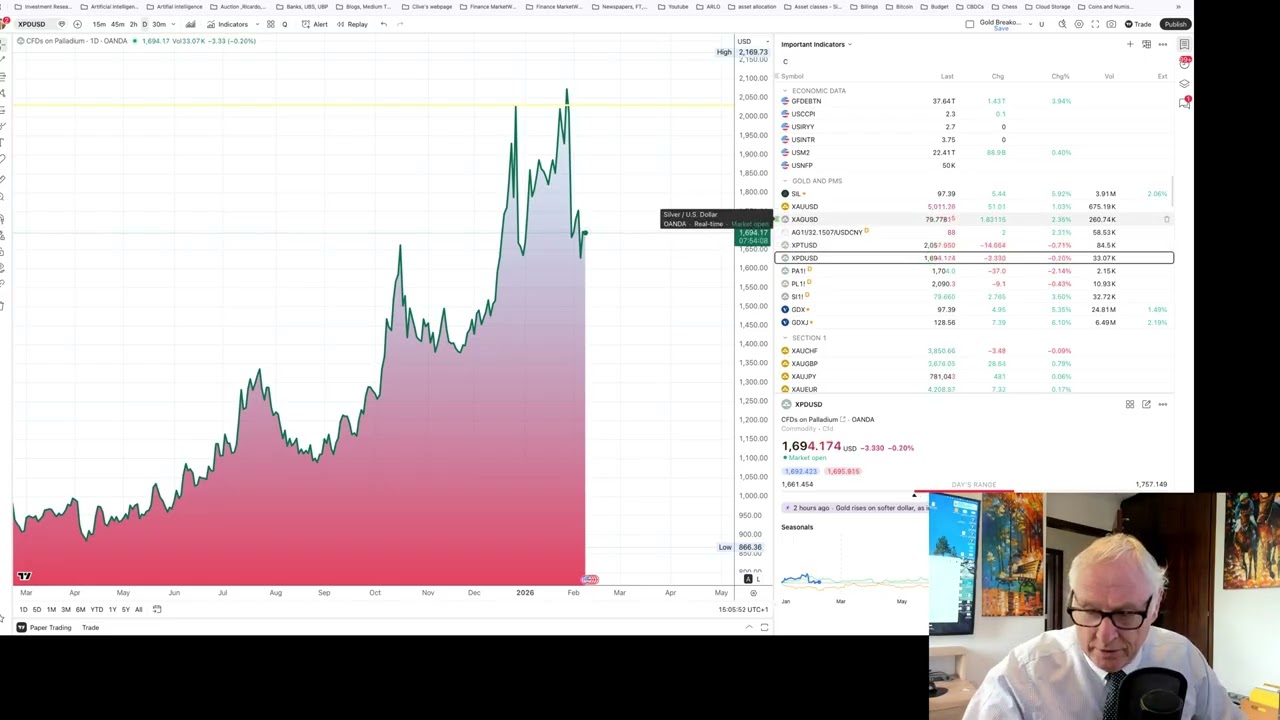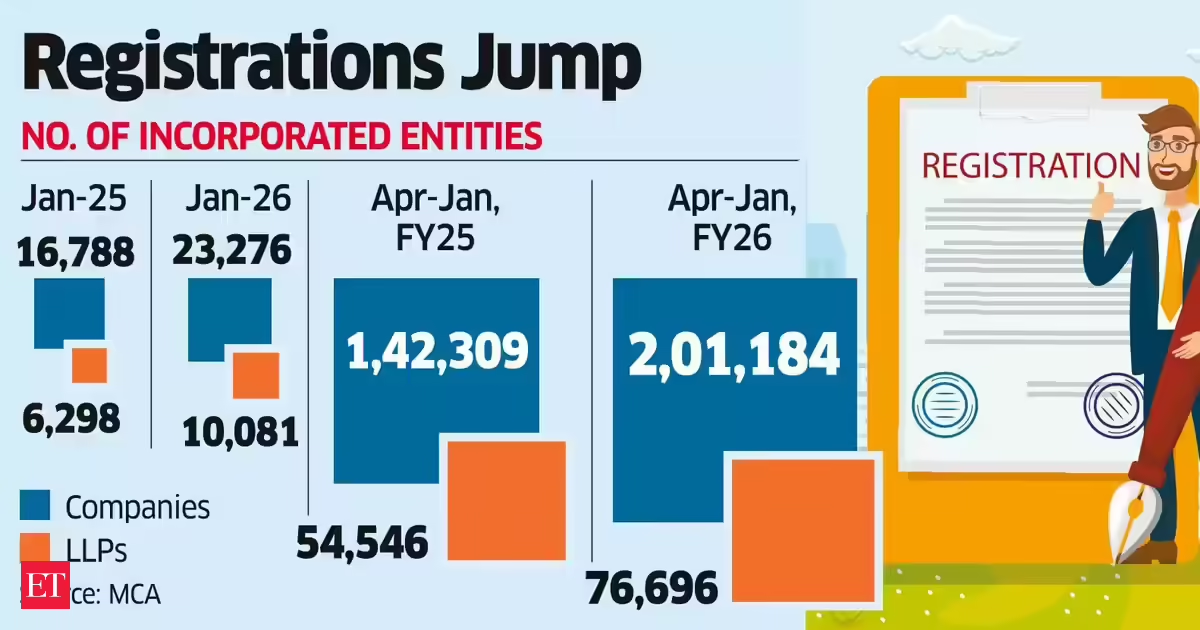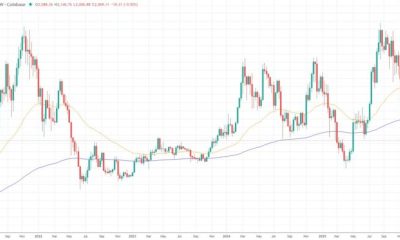Video
Crypto Going To $0 And I’m Here For It…

If you’re here for it to, join our members and start planning and accumulating based on risk
Free Trial – https://app.cryptocapitalventure.ai
Crypto crash continues
Ben Cowen hops on at 01:28:15
source
Video
How Criminals Robbed $4.3M In Crypto And Filmed The Whole Thing

A knock at the door… but they weren’t there to drop off a parcel.
Three juveniles from Sheffield targeted a victim in London, stealing $4.5m in cryptocurrency before fleeing in the victim’s car. They even posted videos of their crime on Snapchat.
They didn’t get far. Our teams tracked down and detained all three as they drove back north.
They were sent to prison for a total of 16 years and the victim’s crypto was recovered in just 72 hours.
source
Video
Age 36, Net Worth $40M: Every Single Investment I Own

✅Join My Private Group & access 1000xStocks. Apply with this link https://www.financialeducationjeremy.com/indx-ytm
❤️ Join my Patreon with this link https://www.patreon.com/JeremyLefebvre
💰How much money you need to quit your job free workshop
https://www.fejeremy.com/retire-ytm
🏆 Watch my NEW free 5-day workshop, to understand how to become a great investor – https://www.fejeremy.com/foundations
🔑 How I find 10X Stocks Free Workshop. Enjoy! https://www.fejeremy.com/10x
SOCIALS:
My IG: https://www.instagram.com/financialeducationjeremy
My X: https://twitter.com/HolySmokas
My FB: https://www.facebook.com/financialeducationjeremy
My Jeremy Lefebvre website https://jeremylefebvre.co
1000XStocks Instagram link https://www.instagram.com/1000xstocks
1000XStocks X link https://x.com/1000xStocks
If you are a company looking to sponsor Jeremy Lefebvre reach out to his Instagram Financial Education Jeremy
This is a Jeremy Lefebvre Production
Stocks to buy stock market investing investment stocks to watch nasdaq tech stocks tesla stock palantir stock nvidia stock.
Jeremy Lefebvre
Jeremy Lefebvre stocks
Jeremy Lefebvre stock market
Jeremy Lefebvre makes money
Jeremy Lefebvre private stock group
Jeremy Lefebvre portfolio
Financial Education
Created by Jeremy Lefebvre
LMK if you know any stocks to buy now or stocks to watch!
source
Video
Cardi B – Money | Lyrics

Subscribe & Watch Today’s Best Lyric Videos Daily On Dark City Sounds!
Stream Money by Cardi B: https://open.spotify.com/track/0Li1OuXXfi7950ilZUFGkF?si=1d5e37f2404645df
Listen To Hot Trending Playlists With Cardi B: https://www.youtube.com/playlist?list=PL25GGqiaXjbwkD4cUSEKcaBn_BSm9LRPo
Cardi B – Money | Lyrics:
[Verse 1]
Look, my bitches all bad, my niggas all real
I ride on his dick in some big tall heels
Big fat checks, big large bills
Front, I’ll flip like ten cartwheels
Cold ass bitch, I give broads chills
Ten different looks and my looks all kill
I kiss him in the mouth, I feel all grills
He eat in the car, that’s meals on wheels (Woo)
[Chorus]
I was born to flex (Yes)
Diamonds on my neck
I like boardin’ jets, I like mornin’ sex (Woo)
But nothing in this world that I like more than checks (Money)
All I really wanna see is the (Money)
I don’t really need the D, I need the (Money)
All a bad bitch need is the (Money flow)
I got bands in the coupe (Coupe)
Bustin’ out the roof
I got bands in the coupe (Coupe)
Touch me, I’ll shoot (Bow)
Shake a lil ass (Money)
Get a little bag and take it to the store (Store, money)
Get a little cash (Money)
Shake it real fast and get a little more (Money)
I got bands in the coupe (Coupe)
Bustin’ out the roof
I got bands in the coupe (Brrr)
Bustin’ out the roof (Cardi)
[Verse 2]
I gotta fly, I need a jet, shit
I need room for my legs
I got a baby, I need some money, yeah
I need cheese for my egg
All y’all bitches in trouble
Bring brass knuckles to the scuffle
I heard that Cardi went pop
Yeah, I did go pop (Pop)
That’s me bustin’ they bubble
I’m Dasani with the drip
Baby mommy with the clip
Walk out Follie’s with a bitch
Bring a thottie to the whip
If she fine or she thick, goddamn
Walkin’ past the mirror, ooh
Damn, I’m fine (Fine)
Let a bitch try me, boom (Boom)
Hammer time, uh
[Chorus]
I was born to flex (Yes)
Diamonds on my neck
I like boardin’ jets, I like mornin’ sex (Woo)
But nothing in this world that I like more than checks (Money)
All I really wanna see is the (Money)
I don’t really need the D, I need the (Money)
All a bad bitch need is the (Money flow)
I got bands in the coupe (Coupe)
Bustin’ out the roof
I got bands in the coupe (Coupe)
Touch me, I’ll shoot (Bow)
Shake a lil ass (Money)
Get a little bag and take it to the store (Store, money)
Get a little cash (Money)
Shake it real fast and get a little more (Money)
I got bands in the coupe (Coupe)
Bustin’ out the roof
I got bands in the coupe (Brrr)
Touch me, I’ll shoot (Bow)
[Verse 3]
Bitch, I will pop on your pops (Your pops)
Bitch, I will pop on whoever (Brrr)
You know who pop the most shit? (Who?)
The people whose shit not together (Okay)
You’da bet Cardi a freak (Freak)
All my pajamas is leather (Uh)
Bitch, I will black on your ass (Yeah)
Wakanda forever
Sweet like a honey bun, spit like a Tommy gun
Rollie a one of one, come get your mommy some
Cardi at the tip-top, bitch
Kiss the ring and kick rocks, sis (Mwah)
Jump it down, back it up (Ooh, ayy)
Make that nigga put down 2K
I like my niggas dark like D’USSÉ
He gonna eat this ass like soufflé
[Chorus]
I was born to flex, diamonds on my neck
I like boardin’ jets, I like mornin’ sex
But nothing in this world that I like more than Kulture
(Kulture, Kulture, Kulture)
All I really wanna see is the (Money)
I don’t really need the D, I need the (Money)
All a bad bitch need is the
K.K.C (Woo)
[Outro]
(Money)
Money
(Money)
(Money)
(Money)
(Money)
(Money)
(Money)
#cardib #hiphopmusic #Lyrics
source
Video
Michael Burry Just Called a Crypto DEATH SPIRAL!! The Data Proves He’s WRONG

🔒 No BS Crypto Community
Join FREE 👉 https://www.nobscrypto.com.au/free
Membership 👉 https://www.nobscrypto.com.au/pricing
____________________________________________________________
💸 Crypto Deals (No KYC)
Bitunix – Up to $8,000 USDT 👉 https://www.bitunix.com/register?vipC…
Phemex – Earn $700+ 👉 https://phemex.com/a/k/NoBsCrypto1
Caleb & Brown (KYC Required) – Secure Crypto Broker 👉 https://calebandbrown.com/affiliates/…
____________________________________________________________
🔐 Security Essentials
Tangem Wallet 👉 https://tangem.com/pricing/?promocode…
NordVPN – From $3/month 👉 https://nordvpn.com/nobscrypto
____________________________________________________________
🚀 Follow Us
X 👉 https://x.com/noBScrypto
IG / TikTok 👉 @no_bscrypto
*THIS IS NOT FINANCIAL ADVICE. I AM NOT A FINANCIAL ADVISOR AND THIS IS PURELY FOR ENTERTAINMENT PURPOSES ONLY! Please consult your financial advisor BEFORE you make any investment decisions.
source
Video
Robinhood Markets has just released financial results for the fourth quarter and full year of 2025.

Robinhood Markets has just released financial results for the fourth quarter and full year of 2025.
Check out the highlights from Vlad Tenev below, and catch our earnings call live at: rbnhd.co/earnings-livestream-YT
source
Video
Cardi B – Money (Official Audio)

Cardi B – “Money” (Official Audio)
Stream/Download: https://CardiB.lnk.to/moneyID
AM I THE DRAMA? 🐦⬛ My new album is out September 19th!
Preorder now: https://cardib.lnk.to/AITD
Subscribe for more official content from Cardi B: https://CardiB.lnk.to/Subscribe
Follow Cardi B
http://cardibofficial.com
http://Instagram.com/iamcardib
Tweets by iamcardib
https://Facebook.com/CardiB
http://Soundcloud.com/IAmCardiB
Exclusive Bardi Gang merchandise available here: https://www.youtube.com/@cardib/store
The official YouTube channel of Atlantic Records artist Cardi B. Subscribe for the latest music videos, performances, and more.
source
Video
EMERGENCY Crypto Bloodbath Wipes $1 TRILLION – JPMorgan “Bitcoin Beats Gold Long-Term”! Buy Now?

EMERGENCY Crypto Bloodbath Wipes $1 TRILLION – JPMorgan “Bitcoin Beats Gold Long-Term”! Buy Now?
OG (partner)
Sign up to OG.com here: https://bit.ly/OGMARKETSWENDYO
The Big Game Bonus: Learn more: Earn Up to $500 More in The Big Game Bonus
#ogpartner #sponsored
iTrustCapital (partner)
https://www.itrustcapital.com/go/crypto-wendy
https://x.com/iTrustCapital
Crypto markets have wiped out over $1T in market cap since mid-January, with BTC falling below its previous cycle high and all post-election gains erased amid heavy liquidations.
It get crazier, because at the same time, JPMorgan says Bitcoin’s long-term outlook is now more attractive than gold, even as short-term volatility shakes out the market!
Are you buying gold and silver? Let me know in the comments! (We also have big XRP news so make sure you watch until the end xo)
00:00 HI
04:48 Bitcoin and altcoin market overview
09:31 Crypto market structure updates
30:00 OG (partner)
31:45 XRP, BNB, and ETH news
34:54 The state of the crypto markets & bitcoin
Support The O Show with Ref Links:
✨Stake VET support TSCL ➡️ https://tinyurl.com/VeChain-WendyO
✨Get $100 with ITRUST ➡️ https://www.itrustcapital.com/go/crypto-wendy
✨Join OG today to trade EVERYTHING ➡️ https://bit.ly/OGMARKETSWENDYO
✨Get 20% off ARCULUS with code Wendy20 ➡️ https://www.getarculus.com/
✨Get 20% off SUMM code WENDY20 ➡️ https://tinyurl.com/Summ-Wendy20
✨GET 10% OFF BITCOIN 2026 USE WENDYO ➡️ https://bit.ly/BITCOIN2026WENDYO
✨Privacy Browser➡️ https://brave.com/wendy
✨Crypto IRAs Advice Mgmt ➡️ https://daimio.typeform.com/WendyO
✨Crypto Services I Use ➡️ https://cryptowendyo.com/partners
✨TOP CRYPTOS I LIKE ON KRAKEN ➡️ https://app.kraken.com/JDNW/WendyO
✨$500 PHEMEX Bonus ➡️https://phemex.com/en/promo/activity/558?referralCode=B6RWJ
Interested in being featured on The O Show?
Contact CryptoWendyO@protonmail.com
Official Wendy O Social Media Links can be found here: https://cryptowendyo.com/partners
CURRENT PARTNERS: MARKET CIPHER – BRAVE
This media is NOT an offer to buy or sell securities, simply for entertainment purposes
Disclaimer: Please be advised that I own a diverse portfolio of cryptocurrency assets, and anything written or discussed in connection to cryptocurrencies– regardless of the subject matter’s content– may represent a potential conflict of interest. I wish to always remain transparent and impartial to the cryptocurrency community, and therefore, the content of my media is intended FOR GENERAL INFORMATION PURPOSES ONLY. Nothing that I write or discuss should be construed, or relied upon, such as investment, financial, legal, regulatory, accounting, tax or similar advice. Nothing should be interpreted as a solicitation to invest in any cryptocurrency, and nothing herein should be construed as a recommendation to engage in any investment strategy or transaction. Please be advised that it is in your own best interests to consult with investment, legal, tax or similar professionals regarding any specific situations and any prospective transaction decisions. This channel is not responsible for the performance of actions of any sponsors, partners or affiliates. All information is found publicly on the internet and could change or be doctored now or any time in the future. This channel is for entertainment purposes ONLY and does not intend to slander or harm anyone.
PLEASE NOTE: In consideration for producing content the company, made a generous contribution to support the “CryptoWendyO” socials channel. This disclosure is in compliance with Section 17(b) of the United States Securities Act of 1933.
#bitcoin #btc #cryptomarket #cryptotrading #trading #cryptolegislation #cryptoregulation #bitcoinreserve #cbdc #xrp #ripple #cryptostocks #stocks #stockmarket #ethereum #eth #ether #ai #artificialintelligence #aiagents #aiagent #bnbchain #bnb #binance #jpmorgan #gold #preciousmetals #spotbitcoinetf #bitcoinetf #etf #etfs #cryptoetf #cryptoetfs #cryptomining #bitcoinmining #cme #worldlibertyfinancial #donaldtrump #trump #wlfi #brianarmstrong #coinbase #cryptonews #crypto #cryptocurrency #xrpripple #cryptowendyo #solana #sol #dogecoin #doge #cardano #ada #hbar #vechain #finance
bitcoin,btc,crypto,cryptocurrency,cryptowendyo,ethereum,eth,crypto news,bitcoin news,ripple xrp,bitcoin price,bitcoin price prediction,xrp news,cryptocurrency news,crypto news today,btc news,ripple xrp news,bitcoin trading,bull market,cryptonews,crypto trading,crypto liquidation,crypto liquidation today,crypto market,bitcoin price analysis,jpmorgan,gold,precious metals,crypto market structure,crypto market structure bill,crypto legislation,xrp,ripple
source
Video
Financial Markets update Monday 9th February 2026. Update on COMEX silver and Shanghai premium.

Financial News today.
Update on COMEX Silver March Open interest. Delivery problem looming.
Dow hits record 50’000.
Tech stocks up and down, it’s a mixed bag and looking wobbly.
Dollar showing weakness against a basket of currencies, especially the Swiss franc.
No change in BoE rates (3.75%) or in ECB rates (2%). CME Fed watch tool indicates that the 18th March Fed meeting will keep rates on hold at 3.75%.
Gold and Silver are up today with gold above $5000 again but not showing much momentum at $5014 (+1.1%) and silver at $80.14 is up 2.86%.
Open interest for March Silver is currently 380 million ounces, but only 103 million ounces are currently available. February deliveries in the first few days amounted to 100% of the open interest of a month before.
🤝 Support the Channel & Useful Resources
If you’d like to support the channel, please consider using the affiliate links below. It doesn’t cost you anything extra and helps me continue producing independent, high-quality investment content.
📊 SimplyWall.st
You can unlock the free version of SimplyWall.st using my link below:
👉 https://goto.simplywall.st/AP4L3a
• No credit card required
• One portfolio and up to 10 stocks
You can also receive 30% off the Unlimited version by upgrading through the affiliate link below this video.
The Unlimited plan costs less than a cup of coffee per week — and if you can’t afford a cup of coffee, you probably shouldn’t be trading stocks.
🪙 Interested in Gold or Silver?
If you’re considering whether gold or silver could play a role in your portfolio or pension savings — or you’d like guidance on what type of precious metals to own — my trusted affiliates in the UK, Europe, and the USA would be happy to speak with you.
🇬🇧 UK & Europe — Gold Bullion Partners
Gold Bullion Partners handle large orders efficiently, offer highly competitive pricing, and provide excellent investor support.
📞 Call Nick: +44 207 031 8077
📩 Request a call back:
Please mention “Clive Thompson” in the “How did you hear about us?” box and include your country code.
UK investors: Gold can now be held inside a SIPP, and Gold Bullion Partners can arrange this for you.
🇺🇸 USA — ITM Trading
ITM Trading helps U.S. investors protect their wealth with physical gold and silver.
📞 Call: 866-449-9330
📩 Request a call back:
https://calendly.com/itmtrading/clive
More information:
https://learn.itmtrading.com/clive
Thank you very much for supporting the channel.
👤 About Me
I’ve been investing for over 50 years. I’ve made plenty of mistakes — and I’ve learned from them.
My aim is to help you grow and protect your wealth by sharing real-world experience: when to own stocks, bonds, cash, gold, silver, property, and other assets — and just as importantly, when not to.
You can learn more about my work, portfolios, and resources at:
👉 https://clivethompson.com/
Learn from my mistakes — so you don’t have to make them yourself.
Ask
source
Video
The Real XRP Flip Of The Switch

Welcome to Zach Rector’s channel!
iTrust Capital- https://www.itrustcapital.com/go/zach-rector
Legal & Estate Planning- https://calendly.com/new-client-specialists/15-minute-interview-affiliate?a1=Rector&month=2025-12
Are you ready to take advantage of the greatest transfer of wealth in world history?
Join our community at http://www.ZachRector.com and discover how you can not only survive, but thrive in this exciting time.
XRP Family MERCH- https://zachrector.com/shop/
Patreon/Discord Private Community- https://www.patreon.com/zachrector
Buy XRP & Trade Crypto-
Caleb & Brown- https://www.calebandbrown.com/affiliates/zach-rector/
Uphold- https://wallet.uphold.com/signup?referral=7ae0597d45
Coinbase- https://coinbase.com/join/PJCHZE2?src=ios-link
Coinbase Advanced Trading- https://advanced.coinbase.com/join/XXTYJ2Z
First Ledger- https://firstledger.net/?ref=DO9SdgMahaeK
Send XRP Tips & NFTs- r41a9RBNQYVx1XowGUUNEbJxKdKnMpHQEo
Precious Metals- https://zachrector.com/gold-and-silver/
Book 1 on 1 Call with Zach- https://calendly.com/zachrector/30min?month=2024-09
Crypto Wallets-
Ellipal- https://www.ellipal.com/?rfsn=6318619.6c7e7c
DCent Wallet- https://store.dcentwallet.com/products/biometric-wallet-affiliates?bg_ref=qBGObYeQ71
Trezor- https://trezor.io/trezor-model-t?transaction_id=102790791fb667a080e84dbbf37fc1&offer_id=134&affiliate_id=10442
Follow us on social media for the latest updates on:
Twitter (https://www.twitter.com/ZachRector7),
Rumble (https://www.rumble.com/user/zachrector7),
YouTube (https://www.youtube.com/user/Rector94),
TikTok (https://www.tiktok.com/@ZachRector7).
Thank you for joining us on this journey to financial freedom!
#xrp #ripple #xlm #stellar #xdc #buyback
#CryptocurrencyExchange #CryptocurrencyWallet #CryptocurrencyMarketNews #AltcoinInvesting #BlockchainTechnology #CryptocurrencyRegulations #HODL
#trading #investing #altcoins #crypto #blockchain #cryptocurrency #bitcoin
source
Video
Fractal Analytics and Aye Finance IPO Final Decision #shorts

#fractalanalyticsipo
#fractalanalytics
#fractalanalyticsipoguide
#fractal
#fractalanalyticsipotips
#fractalipo
#ayefinanceipo
#ayefinance
#ayefinanceipoguide
#ayefinanceipogmp
#ayefinanceiponews
#ayefinanceipotips
#newipo
fractal analytics ipo
fractal ipo
fractal analytics ipo review
fractal analytics
fractal analytics limited
fractal analytics limited ipo
fractal analytics ltd ipo
fractal analytics ltd
fractal analytics ipo analysis
fractal analytics ipo latest update
fractal analytics ipo update
fractal analytics ipo news
fractal analytics ipo apply or not
fractal analytics ipo apply or avoid
fractal analytics ipo subscribe or not
fractal analytics ipo announcement
fractal analytics ipo investment
fractal analytics ipo guide
fractal analytics ipo investment strategy
fractal analytics ipo insights
fractal analytics ipo tips
fractal analytics ipo gmp
fractal analytics ipo subscription
fractal analytics ipo final decision
aye finance ipo
aye ipo
aye finance ipo review
aye finance
aye finance limited
aye finance limited ipo
aye finance ltd ipo
aye finance ltd
aye finance ipo analysis
aye finance ipo latest update
aye finance ipo update
aye finance ipo news
aye finance ipo apply or not
aye finance ipo apply or avoid
aye finance ipo subscribe or not
aye finance ipo announcement
aye finance ipo investment
aye finance ipo guide
aye finance ipo investment strategy
aye finance ipo insights
aye finance ipo tips
aye finance ipo gmp
aye finance ipo subscription
aye finance ipo final decision
latest ipo
ipo final decision
source
-

 Tech7 days ago
Tech7 days agoWikipedia volunteers spent years cataloging AI tells. Now there’s a plugin to avoid them.
-

 Politics2 days ago
Politics2 days agoWhy Israel is blocking foreign journalists from entering
-

 NewsBeat1 day ago
NewsBeat1 day agoMia Brookes misses out on Winter Olympics medal in snowboard big air
-

 Sports4 days ago
Sports4 days agoJD Vance booed as Team USA enters Winter Olympics opening ceremony
-

 Tech4 days ago
Tech4 days agoFirst multi-coronavirus vaccine enters human testing, built on UW Medicine technology
-

 Business2 days ago
Business2 days agoLLP registrations cross 10,000 mark for first time in Jan
-

 NewsBeat2 days ago
NewsBeat2 days agoWinter Olympics 2026: Team GB’s Mia Brookes through to snowboard big air final, and curling pair beat Italy
-

 Sports2 days ago
Sports2 days agoBenjamin Karl strips clothes celebrating snowboard gold medal at Olympics
-

 Tech1 hour ago
Tech1 hour agoSpaceX’s mighty Starship rocket enters final testing for 12th flight
-

 Politics3 days ago
Politics3 days agoThe Health Dangers Of Browning Your Food
-
Sports4 days ago
Former Viking Enters Hall of Fame
-
Sports5 days ago
New and Huge Defender Enter Vikings’ Mock Draft Orbit
-

 Business3 days ago
Business3 days agoJulius Baer CEO calls for Swiss public register of rogue bankers to protect reputation
-

 NewsBeat5 days ago
NewsBeat5 days agoSavannah Guthrie’s mother’s blood was found on porch of home, police confirm as search enters sixth day: Live
-

 Business5 days ago
Business5 days agoQuiz enters administration for third time
-

 Crypto World13 hours ago
Crypto World13 hours agoBlockchain.com wins UK registration nearly four years after abandoning FCA process
-

 Crypto World21 hours ago
Crypto World21 hours agoU.S. BTC ETFs register back-to-back inflows for first time in a month
-

 NewsBeat2 days ago
NewsBeat2 days agoResidents say city high street with ‘boarded up’ shops ‘could be better’
-
Sports1 day ago
Kirk Cousins Officially Enters the Vikings’ Offseason Puzzle
-

 Crypto World21 hours ago
Crypto World21 hours agoEthereum Enters Capitulation Zone as MVRV Turns Negative: Bottom Near?







